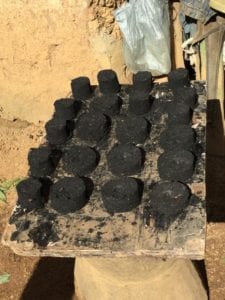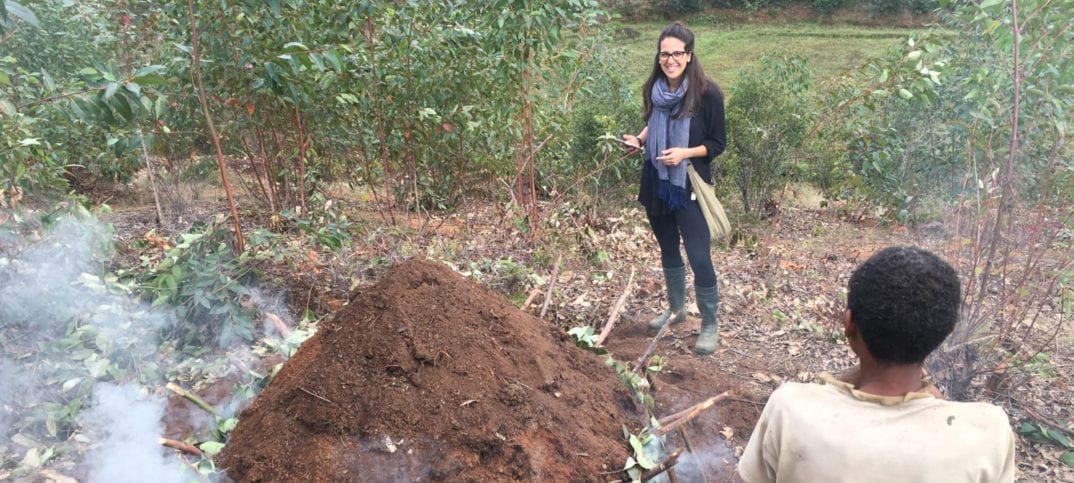By Daniel Dunaief
BeLocal has progressed from the drawing board to the kitchen. The nonprofit group, which was started by the husband and wife team of Mickie and Jeff Nagel as well as data scientist Eric Bergerson, has been working to improve and enhance the lives of people living in Madagascar.
BeLocal, which started in 2016, has sent representatives, including Laurel Hollow resident Mickie Nagel and executive director Leila Esmailzada, to travel back and forth to the island nation off the southeast coast of the African continent.
Working with Stony Brook University students who identified and tried to come up with solutions for local challenges, BeLocal has focused its efforts on creating briquettes that use biomass instead of the current charcoal and hardwood, which not only produces smoke in Malagasy homes but also comes from cutting down trees necessary for the habitat and the wildlife it supports.

“In the summer of 2018 we figured out that we had something that works,” said Mickie Nagel. “We had all the agricultural waste and could turn it into fuel. Our goal is to start thinking about how to bring it into communities and into the daily lives” of people in Madagascar.
In January of this year, Esmailzada partnered up with Zee Rossi to introduce the new briquettes to residents of three villages, who were interested in the BeLocal process and offered feedback.
Rossi worked in Madagascar for three years as a part of the Agricultural Food Security Advisory Section of the Peace Corps, until he recently joined the staff at BeLocal.
At this point, BeLocal has helped create four working production sites for the briquettes, all of which are on the outskirts of the Ranomofana National Park, which Stony Brook Professor Patricia Wright helped inaugurate in 1991.
The biochar briquettes solve several problems simultaneously. For starters, they reduce the amount of hardwood Malagasy residents chop down to provide fuel for cooking. The biochar briquettes are made from agricultural waste, such as corn husks and cobs, rice stalks, leaves, small sticks and even unusable waste from the production of traditional charcoal.
The briquettes also produce less smoke in the homes of the Malagasy. At this point, BeLocal doesn’t have any data to compare the particulates in the air from the briquettes.
One of the current briquette makers is generating about 2,000 of the circular fuel cells per month. As a start-up effort, this could help with several families in the villages. Nagel estimates that it takes about 12 briquettes to cook a meal for a family of four. The families need to learn how to stoke the briquettes, which are slightly different from the cooking process with the charcoal and hardwood.
Esmailzada and Rossi had planned to return to Madagascar in July, where they hoped to understand how people are using these sources of energy.
Esmailzada has taught and workshopped with the Malagasy on how to make the briquettes. Since returning to the United States, where she recently completed a master’s program in public health with a focus on community health at Stony Brook University, she was eager to see how much progress has been made.
BeLocal has continued to refine the technique for creating these briquettes. Working across the border with Stony Brook graduate student Rob Myrick, Malagasy residents have tried to char the biomass in a barrel, instead of digging a pit.
“Hopefully there will be movement” with the barrel design, Nagel said.
Myrick is working on refining the airflow through the pit, which could enhance the briquette manufacturing process.
Myrick will “work on techniques [at Stony Brook] and [Rossi] will work on the process with the villagers over there,” Nagel explained in an email. Myrick has been “such a helpful and great addition to BeLocal.”
Esmailzada and Nagel are delighted that Rossi joined the BeLocal effort.
“It’s such a natural partnership,” Esmailzada said. “He built this incredible trust with this group of really dynamic people. Having him be the liaison between us and the community really came together nicely.”
Rossi explained some of the challenges in developing a collaboration that works for the Malagasy. “One of the biggest barriers is being a foreigner,” he said. “With any new thing you present to a farmer, you have to sell yourself first. It’s really important that you connect with a farmer on a person-to-person level.”
Numerous farmers are skeptical of the ongoing commitment foreign groups will have. Many of them have experience with a foreigner or a local nongovernmental organization coming in, doing a program and “not following up,” Rossi added.
Nagel is putting together a nongovernmental organization conference to get the organizations “working on projects in the same room,” she said.
Through this effort, BeLocal hopes to create new partnerships. The organization continues to work with Stony Brook’s VIP program, which stands for vertically integrated projects.
Students from sophomore year through graduate school can continue to work on the same projects. The goal is to enable a continued commitment, which the school hopes will lead to concrete results, instead of one-year efforts that often run into obstacles that are difficult to surmount in a short period of time.
Ultimately, Nagel believes the process of building briquettes could translate to other cross-border efforts and suggested that these goals should include the kind of information crowd-sourcing that benefits from other successful projects.
BeLocal is receptive to support from Long Islanders and elsewhere.
Nagel added that projects like the briquette effort keep the context and big picture in mind.
“Helping Patricia Wright save this rain forest and the lemurs will always be a goal and we know the only way to do that is to help with alternatives to food and fuel sources, and better farming techniques so they don’t have a need to slash and burn more rain forest to add more farming fields,” Nagel said.







